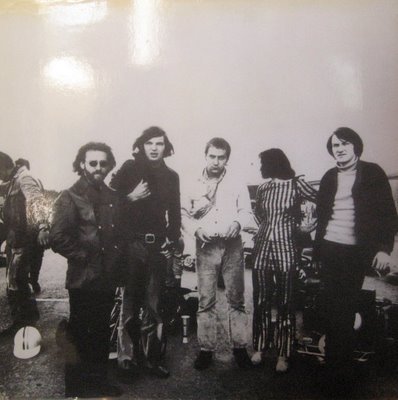
8.5.07
Joachim Kühn, pianista alemão (1944, Leipzig). Em 1969, com uma formação eclética, recrutada entre a fina-flor que no Velho Continente ia despontando investida no poder de alterar o estado de coisas, o grande Kühn explorava aspectos free do jazz, combinados com groove, soul e outros sinais identitários do jazz de finais de 60, com influências norte-americanas e europeias, sobretudo. Bold Music é o disco em que confessadamente J. K. procurou libertar-se das principais marcas da sua formação como pianista de jazz, para abraçar o conceito da liberdade plena, a caminho da improvisação total. Joachim Kühn em piano, saxofone alto, antilope-horn, shenai, sinos, gongs e voz, com Jean François Jenny-Clarke, contrabaixo e violoncelo, Jacques Thollot, percussão, e Stu Martin, bateria e percussão. Gravação de Junho de 1969, um ano de grande ressaca. Editado em LP, apenas se encontra hoje disponível em CD via MPS (Musik Produktion Schwarzwald) japonesa. Pois, claro. Dizer que o disco é interessante acaba por ser muito curto. Tal como a própria persona himself. "No prroblem, I zu ziz all ze time", dizia-me ele uma noite, quando lhe fazia ver que eu não estava em condições de conduzir o automóvel em tal estado gasoso. Mas atentai por breves momentos nas pertinentes palavras de Herr Kühn, que as escreveu para acompanhar o LP de que se fala:
"I still remember how I used to play in East Germany - in Leipzig, Dresden, East Berlin - and how I was influenced by Horace Silver, Red Garland, Bobby Timmons, McCoy Tyner, and all the others, until one day, I said to myself: all I do is copy others - and then I really started to work on becoming free inside, to find my own style. I also remember a night in Potsdam, East Germany with my old trio, towards the end of 1964, when we came to the conclusion that we couldn't go on like this any more, you know, nothing but long solos on old standards and chord changes. Of course we were completely isolated in East Germany then. I had only contacts with Poland, where we used to play the Warsaw Festivals, and with Czechoslovakia, but the musicians there, too, were still far from playing free. The first time I heard Cecil Taylor was when I came to the West. When I began to play more freely I still had the musical conception that compositions should be played more or less predetermined. Today, I feel that everything is happening in music should develop naturally. You don't have to give musicians the same old instructions. On this record four musicians of outstanding individuality have come together - and each should go his own way - yet, in the end, we all arrive at the same point. This, for me, is the great attraction of playing together with others in a group. For these reasons I am against playing the theme and then starting to improvise, the way it used to be. If the piece is based on a theme, it can be sufficient to state it at the end - as the goal towards which we were all playing. As to the improvisation, it is important to get into it without influences, uninfluenced even by a theme: Total improvisation. Total music. This doesn't apply only to a small group, like my quartet, but to big bands as well". - Joachim Kühn
"I still remember how I used to play in East Germany - in Leipzig, Dresden, East Berlin - and how I was influenced by Horace Silver, Red Garland, Bobby Timmons, McCoy Tyner, and all the others, until one day, I said to myself: all I do is copy others - and then I really started to work on becoming free inside, to find my own style. I also remember a night in Potsdam, East Germany with my old trio, towards the end of 1964, when we came to the conclusion that we couldn't go on like this any more, you know, nothing but long solos on old standards and chord changes. Of course we were completely isolated in East Germany then. I had only contacts with Poland, where we used to play the Warsaw Festivals, and with Czechoslovakia, but the musicians there, too, were still far from playing free. The first time I heard Cecil Taylor was when I came to the West. When I began to play more freely I still had the musical conception that compositions should be played more or less predetermined. Today, I feel that everything is happening in music should develop naturally. You don't have to give musicians the same old instructions. On this record four musicians of outstanding individuality have come together - and each should go his own way - yet, in the end, we all arrive at the same point. This, for me, is the great attraction of playing together with others in a group. For these reasons I am against playing the theme and then starting to improvise, the way it used to be. If the piece is based on a theme, it can be sufficient to state it at the end - as the goal towards which we were all playing. As to the improvisation, it is important to get into it without influences, uninfluenced even by a theme: Total improvisation. Total music. This doesn't apply only to a small group, like my quartet, but to big bands as well". - Joachim Kühn
The Joachim Kühn Group circa 1969



